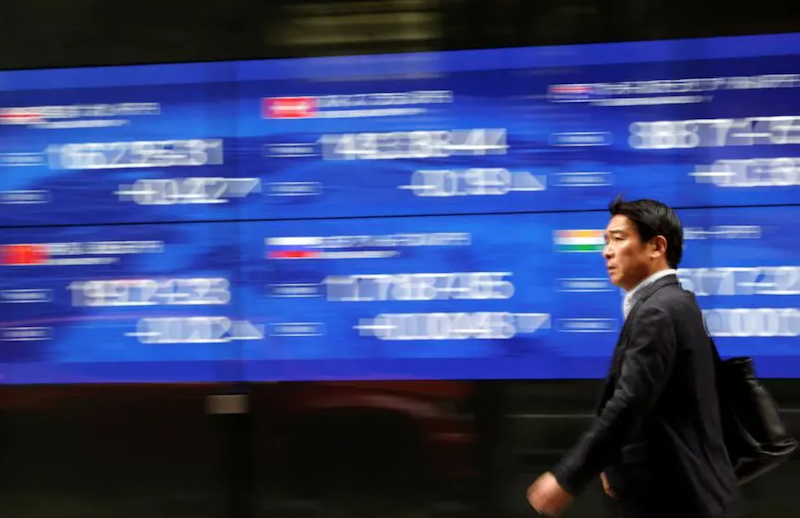Asian stocks slipped on Wednesday, retreating after worries resurfaced about the health of the global banking sector, as well as a possible US recession.
But Wall Street futures rose on bullish updates from Microsoft and Google parent Alphabet and that boosted tech shares in Hong Kong which was an outlier among its peers.
Japan’s Nikkei share average dropped, pressured by overnight Wall Street declines and investors were also cautious ahead of the domestic earnings season getting into full swing from Thursday and new Bank of Japan (BOJ) governor Kazuo Ueda’s first policy decision on Friday.
Also on AF: China Plans Satellite Network for Deep Space Exploration
The Nikkei share average, which had hit an eight-month high on Tuesday, fell 0.71%, or 203.60 points, to close at 28,416.47, while the broader Topix was down 0.89%, or 18.25 points, to 2,023.90.
Robot maker Fanuc, chip-testing equipment maker Advantest and financial giant Nomura Holdings are among the three dozen or so companies reporting results on Wednesday, with that number increasing to more than 100 on Thursday and more than 200 on Friday.
The market consensus is that the BOJ will keep policy unchanged this week, but investors are still wary of surprises, like the unexpected doubling of the 10-year bond yield policy band in December.
Banks led losses among the Tokyo Stock Exchange’s 33 industry sectors, slumping 1.91% after First Republic Bank reported plunging deposits.
China stocks edged lower on Wednesday, moving sideways as investors were cautious ahead of the upcoming May Day ‘Golden Week’ holiday, while persistent geopolitical tensions also weighed on sentiment.
Nine Republican senators called on the Biden administration to impose sanctions against Huawei Cloud and other Chinese cloud service providers, citing national security concerns.
The Shanghai Composite Index slipped 0.02%, or 0.77 points, to 3,264.10, but the Shenzhen Composite Index on China’s second exchange edged up 0.52%, or 10.50 points, to 2,025.08.
Shares in Hong Kong rose, tracking a rebound in US stock futures, as buybacks and earnings beats boosted technology giants in after-hours trade. The Hang Seng Index gained 0.71%, or 139.39 points, to 19,757.27.
Elsewhere across the region, Jakarta, Mumbai and Bangkok were up, while Taipei was more or less flat. Sydney, Wellington, Seoul, Manila, Singapore and Kuala Lumpur were all down.
First Republic Bank Shares Slump
Global stock markets moved in opposite directions as worries over the banking sector returned.
Shares in troubled San Francisco-based lender First Republic Bank hit a record low on Tuesday as it disclosed a $100 billion plunge in deposits, reviving fears over smaller US banks that began with Silicon Valley Bank’s collapse in March.
But ahead of quarterly results from Facebook parent Meta Platforms later in the day, Nasdaq futures were up 1.2% on Wednesday morning in Europe and S&P 500 futures gained 0.3%.
US and European financial conditions have tightened significantly since the Federal Reserve and European Central Bank embarked on their most aggressive interest rate-hiking cycles for decades last year to battle inflation.
This has dented confidence towards loan-dependent sectors such as real estate, and raised questions over how global banks will deal with defaults.
S&P 500, Nasdaq Slip
Deposit flight from US banks has prompted investors to dial down profit expectations for the global banking sector, with banks under pressure to raise interest rates on savings accounts to keep hold of customers’ money.
The benchmark S&P 500 and Nasdaq indexes had both fallen heavily on Tuesday following weak consumer confidence data, while bonds rallied sharply and interest rate futures markets priced in a higher chance of Fed cuts later in the year.
US ten-year yields fell nearly 12 basis points (bps) on Tuesday, their sharpest drop in more than a month, while steadying about 2 basis points higher at 3.398% on Wednesday morning in Europe. Germany’s ten-year yield slipped 2 bps to 2.375% after dropping 11 bps in the previous session.
On Wednesday, the US dollar index was steady against most majors after a 0.5% gain the day before. The euro edged 02% higher to $1.10. Gold was pinned just below $2,000 an ounce.
Brent crude futures hovered at $81.35 a barrel, having dropped almost 4% overnight with the risk-averse mood.
Key figures
Tokyo – Nikkei 225 < DOWN 0.71% at 28,416.47 (close)
Hong Kong – Hang Seng Index > UP 0.71% at 19,757.27 (close)
Shanghai – Composite < DOWN 0.02% at 3,264.10 (close)
London – FTSE 100 < DOWN 0.26% at 7,870.98 (0935 GMT)
New York – Dow < DOWN 1.02% at 33,530.83 (close)
- Reuters with additional editing by Sean O’Meara
Read more:
China Finally Completes National Database of Real Estate Owners
China Asks Banks to Cut Deposit Rates Again to Boost Spending
























